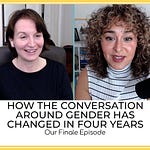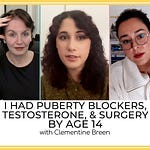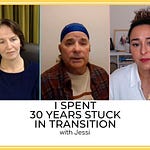With the invention of the term “nonbinary,” we’ve seen an unprecedented number of young people claiming to feel like neither a man nor a woman. Today, we explore Ian Hacking’s concept of “making people up” and the creation of new classifications and “types” of people. Several questions also arise: does a non-binary identification require medicalization? What personality traits may correlate with this identity and is it different in males and females? For parents, how might one respond when a timid child quietly says “No” to the “gender binary?” And what role does non-binary label play as individuals step in and step out of trans identification?
Links:
Gender Census: Gendercensus.com/results/2021-worldwide/#pronouns
Kori and Searyl Doty: Theguardian.com/lifeandstyle/2020/jul/08/parent-raising-gender-free-child
Jamie Shupe: Theguardian.com/world/2016/jun/16/jamie-shupe-first-non-binary-person-oregon
Jamie Shupe: Twitter.com/notabledesister
Lisa Shupe interviewed on Transparency Podcast: Youtube.com/watch?v=edzyk-TQhEY
Sam Smith: Theguardian.com/music/2019/sep/13/sam-smith-on-being-non-binary-im-changing-my-pronouns-to-theythem
Sam Smith and Alok: Mirror.co.uk/3am/celebrity-news/sam-smith-alok-vaid-menon-20126943
Alice Hope’s YouTube video: Youtube.com/watch?v=9WJBp3eEhqY
Extended Notes:
Parents feel so old when the term “nonbinary” gets thrown around. What does it mean?
Sasha gives a bit of context and the definition of the word.
Nonbinary people have an element of protest. They’re completely opting out of the “normal.”
The term “nonbinary” really started picking up speed in 2014 and having it skyrocket in 2019.
Are nonbinary identities just a stepping stone into trans identity?
A lot of nonbinary females think they should have top surgery, which helps them with their image that they’re in this “neither/or” gender space.
Can you inflict your ideologies on a little child? Stella feels like the answer should be no.
There is controversy on listing two mothers or two fathers on the birth certificate. It’s a bit like stretching the truth/reality.
The average 14-year-old female calls herself nonbinary. What’s going on here?
Are our sexual differences causing distress among teenagers? Do they wish for a simpler time where none of this gender stuff matters?
It’s a bit of a confusing thing, you shouldn’t go by looks but a lot of these gender identities use looks as a baseline.
Can you be nonbinary while also looking very female or very male?
How do you know if something is a singular and not a plural when you’re using the “they” pronoun.
How do parents manage other children who are calling themselves they/them?
Sasha wonders if saying you’re nonbinary is due to some uneasiness that’s happening in their lives, some form of trauma or unhappiness happening.
Don’t hang back and feel like everything is fine. Lean into your child’s nonbinary discovery and ask questions.
You can partner with your nonbinary child and still make things feel safe and exploratory.
It’s really hard for adults and parents to call a singular person “they.”
Who was the first legally recognized nonbinary person?
This podcast is partially sponsored by ReIME, Rethink Identity Medicine Ethics:
Learn more about our show: Linktr.ee/WiderLensPod











